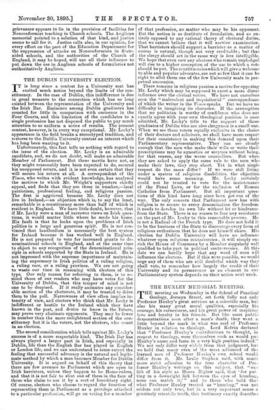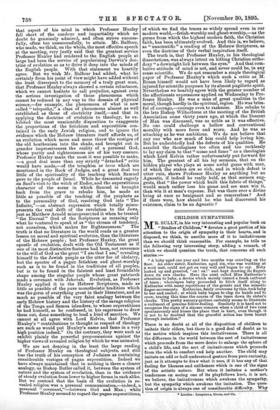THE HTJXLEY MEMORIAL MEETING. T HE meeting on Wednesday in the
School of Practical Geology, Jermyn Street, set forth fully not only Professor Huxley's great services as a scientific man, but also his many great moral qualities, especially his courage, his earnestness, and his great power of inspiring love and loyalty in his friends. But like most public demonstrations soon after a man's death, they went it little beyond the mark in what was said of Professor Huxley in relation to theology. Lord Kelvin declared that "Professor Huxley's contributions to thought, in respect to theology, were themselves such as would put Huxley's name and fame in a very high position indeed." We not only differ very widely from that judgment, but we hold that many even of the most advanced of the learned men of Professor Huxley's own school would differ from it. Mr. Leslie Stephen said, with much more strict adhesion to the true character of Pro- fessor Huxley's writings on this subject, that "one felt of his style as Hosea Biglow said, that for put, ting in a downright lick between the eyes of humbug, none can match it,'" and to those who hold that what Professor Huxley treated as "humbug," was not seldom not only true, but in a very important sense a genuinely scientific truth, this testimony exactly describes that aspect of his mind in which Professor Huxley fell short of the candour and impartiality which no doubt he genuinely admired, and often strove success- fully, often too unsuccessfully, to attain. Mr. Balfour, who made, we think, on the whole, the most effective speech at the meeting, very justly said that the greatest service Professor Huxley had rendered to the English people at large had been the service of popularising Darwin's doc- trine of evolution so as to drive it deep into the minds of the English people. With that statement we heartily agree. But we wish Mr. Balfour had added, what he certainly from his point of view might have added without the least disrespect to the memory of a truly great man, that Professor Huxley always showed a certain reluctance, which we cannot hesitate to call prejudice, against even the serious investigation of those phenomena which cannot be reduced in any way to the domain of physical science,—for example, the phenomena of what is now called "telepathy," a class of phenomena almost as well established as those of electricity itself,—and that in applying the doctrine of evolution to theology, he ex- hibited the most unscientific disposition to exaggerate the proportions of the fetishism and superstition con- tained in the early Jewish religion, and to ignore the evidence which the Hebrew literature itself affords us, of an evolution which more and more threw the vestiges of the old heathenism into the shade, and brought out in grander impressiveness the reality of a personal God, whose purity and righteousness are of his very essence. Professor Huxley made the most it was possible to make, —a good deal more than any strictly "detached" critic would have made,—of the teraphim or lares which are mentioned in the Book of Judges, and a great deal too little of the spirituality of the teaching which Samuel gave to the people of Israel. While he descanted eagerly on Saul's visit to the witch of Endor, and the superstitious character of the scene in which Samuel is brought back from the grave to rebuke him, he made as little as possible of the teaching of the prophets as to the personality of God, resolving God into " The Infinite,"—an abstract expression which totally misre- presents the real drift of the revelation to the Jews, just as Matthew Arnold misrepresented it when he treated " the Eternal" God of the Scriptures as meaning only what he ventured to speak of as "the stream of tendency, not ourselves, which makes for Righteousness." The truth is that no literature in the world reads us a greater lesson on moral and spiritual evolution, than the literature of the Hebrew people ; but Professor Huxley, the great apostle of evolution, dealt with the Old Testament as if one of its most distinctive features had been, not reverence to the will of God as the great "I am that I am," revealing himself to the Jewish people as the utter foe of idolatry, but the spectre of a pagan fetishism and ghost-worship such as is to be found in the traditions of all peoples, but is to be found in the faintest and least formidable shape among the singular people whose great patriarch made a covenant with Jehovah. Evolution, as Professor Huxley applied it to the Hebrew Scriptures, made as little as possible of the pure monotheistic tradition which was the germ of everything great in their literature, and as much as possible of the very faint analogy between the early Hebrew history and the history of the savage religion of the Tonga and Samoa islanders, to whose superstitions he had himself, as he confessed, in his eagerness to draw them out, done something to lend a kind of sanction. We cannot at all agree with Lord Kelvin, that Professor Huxley's "contributions to thought in respect of theology are such as would put Huxley's name and fame in a very high position indeed." On the contrary, they were such as exhibit plainly the powerful prepossessions against the higher views of revealed religion by which he was animated.
We are not denying in the least the large reading of Professor Huxley on theological subjects, and still less the truth of his conception of Judaism as containing considerable vestiges of pagan superstition. Indeed we have always maintained that in nothing is there a clearer analogy, as Bishop Butler called it, between the system of nature and the system of revelation, than in the evidence of steady evolution from lower to higher forms in each alike. But we contend that the basis of the evolution in re- vealed religion was a personal communication,—indeed, a personal "covenant,"—between God and Man ; while Professor Huxley seemed to regard the pagan superstitions, of which we find the traces so widely spread even in our modern world,—fetish-worship and ghost-worship,—as the germs from which the highest modern faith, the Christian faith, has been ultimately evolved. And this is, we believe, as "unscientific" a reading of the Hebrew Scriptures, as even the doctrine of their verbal inspiration itself. The truth is, that Professor Huxley, in his theological dissertations, was always intent on hitting Christian ortho- doxy "a downright lick between the eyes." And that com- bative attitude of mind is not, and never could be, in any sense scientific. We do not remember a single theological paper of Professor Huxley's which such a critic as M. Renan himself would not have been likely to regard as injured for scientific purposes by its almost pugilistic spirit. Nevertheless we heartily agree with the greater number of the affectionate expressions applied on Wednesday to Pro- fessor Huxley. He was a man of great qualities in the moral, though hardly in the spiritual, region. He was brim- ful of courage,—courage even to rashness. His rebuke to the late Bishop Wilberforce at the meeting of the British Association some thirty years ago, at which the Descent of Man was discussed, was as noble as it was effective. No one could challenge a hollow and conventional morality with more force and scorn. And he was as attaching as he was ambitious. We do not believe that any one who saw much of him could help loving him. But he undoubtedly had the defects of his qualities. He assailed the theologians too often and too recklessly to lay any claim to that "name and fame" as a theologian which Lord Kelvin rather unfortunately put forward for him. The greatest of all his lay sermons, that on the hidden player who plays at some awful game with man, of which the stakes are so rich, and in which defeat is utter ruin, shows Professor Huxley as anything but an Agnostic, if indeed he really held, as that sermon sug- gests, that "the power which built this fabric of things," would much rather lose his game and see man win it, than win it at man's expense. But was there ever a divine being at once so benignant and so remorseless ? And if there were, how should he who had discovered his existence, claim to be an Agnostic ?











































 Previous page
Previous page